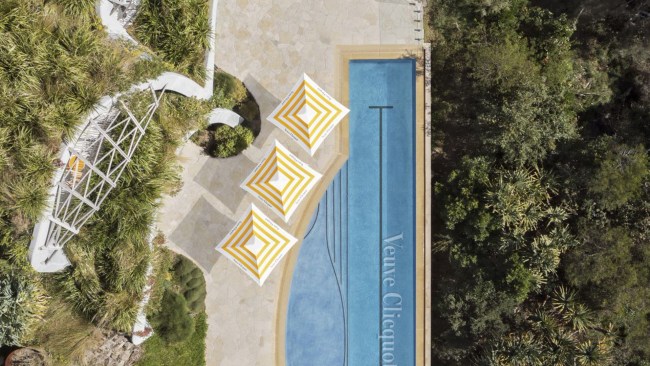Dutch treats in the Ubud highlands
SECRETED down a meandering road in the village of Payangan, Alila Ubud reveals itself in layers, like an unfurling flower.

SECRETED down a meandering road in the village of Payangan, Alila Ubud reveals itself in layers, like an unfurling flower.
Just when it seems impossible that luxury lodgings of any serious stripe could be hidden amid ricefields and dense groves of spiky bamboo, monumental stone buildings emerge one by one. And then, looking down the valley, I see a dark-tiled pool clasped above the plunging Ayung River valley.
The open-sided Plantation restaurant at this elegant resort in the Balinese hill station of Ubud is something of a hidden wonder too. This is where Dutch-born executive chef Eelke Plasmeijer dishes up some of the holiday isle's most inventive food. His right-hand man is Ray Adriansyah, an Indonesian who did his training in New Zealand and has a perfect Flight of the Conchords accent.
As I trade Brett and Jemaine jokes with Adriansyah, there's already a sense of fun afoot and Plasmeijer hasn't even finished explaining the line-up of infused vodkas, araks and syrups displayed in jolly ranks, like costumed attendants, on the restaurant's bar.
After five years in Indonesia, and since leaving Ma Joly restaurant at Tuban in Bali and joining Alila Ubud in mid-2010, he has been building up a colourful range of flavoured potions to use in cooking and cocktails. Rambutan and lime juice form one sharp combination while hibiscus flowers are suspended in vodka like the cocktail equivalent of a pink-tinged lava lamp. Other infusions include watermelon, jasmine, chilli, vanilla and star anise.
You could head here just for a luscious "seasonal" or "design" cocktail and pay 95,000 rupiah ($10.40), or perhaps settle in with a low-priced tapas-style bar snack such as vegetable spring rolls with mild chilli sauce and pickles or a charcuterie plate with rye bread, mustard and pickles.
But that would be to miss the main event -- Plasmeijer's tasting menus, which change according to the season but reflect the chef 's signature style of Indonesian and French flavours.
This is a fine place to try a sampler of traditional Balinese food, with the option of wines matched to each of the courses.
Tempe tepung (crispy fried tempe in Balinese-style batter, served with sambel ulek) starts proceedings, followed by pulung-pulung ikan (fish soup with young papaya, red beans, grated coconut and fried shallots) and, several delicious dishes later, the palate-cleansing dessert is es daluman (a subtle jelly made from daluman leaves and served with coconut milk, crushed ice and palm sugar syrup).
Plasmeijer says he is trying not to rely on imports and has set up a network of neighbourhood organic suppliers; farther afield, berries come from Java while mussels, razor clams and scallops are sourced from the Indonesian island of Lombok. He says his herb garden is starting to flourish, despite humidity and rain.
Plasmeijer's seasonal tasting menu shows his enviable skill at marrying Asian flavours with classical French techniques but keeping everything light and appropriate to Bali's sultry climate. To perk the palate, maybe a soft-boiled egg, perched upright on a bed of citrus rock salt in a martini glass. It looks frankly odd but then arrive spears of asparagus lightly coated with tempura batter. Dip these crisp batons into the golden yolk and crumble the lemon-lime salt to taste -- get packing, soldier toast, this is a sensational twist on a nursery favourite.
Each dish is as decorative and precise as a still life; an "into the vegetable garden" starter, for example, is composed of miniature herbs, stems, shoots, vegetables and edible flowers that wind across a granite plate like a springy path. He dresses pan-fried coral trout with a foamy sauce of young leeks and Balinese lime; a par-cooked slice of tuna is enlivened with soy jelly and prettied-up with borage flowers.
Even the sides are inventive: house-baked walnut and raisin bread, for example, comes with a dipping sauce of mango puree and virgin coconut oil. Desserts, too, cross the cultural divide; chocolate creations are complemented with kaffir lime sorbet or mango compote and a daring mousse combines avocado and chopped white chocolate.
And don't think it's over yet. A cuppa for the road? Make it green tea muddled with mint leaves, lemongrass syrup and lime wedges, served over crushed ice.
Checklist
Seasonal tasting menus for lunch or dinner at Alila Ubud from R475,000 for five courses (R950,000 with wine pairings) to R575,000 for seven courses (R1,150,000 with wine). Authentic (Balinese) tasting menus of three, four or five courses, from R350,000 to R450,000 plus taxes. A la carte dishes also available.
The resort offers 56 rooms, including eight villas, four of which have private pools. From $US158 a night if booked 14 days in advance for a minimum two-night stay. More: alilahotels.com.



